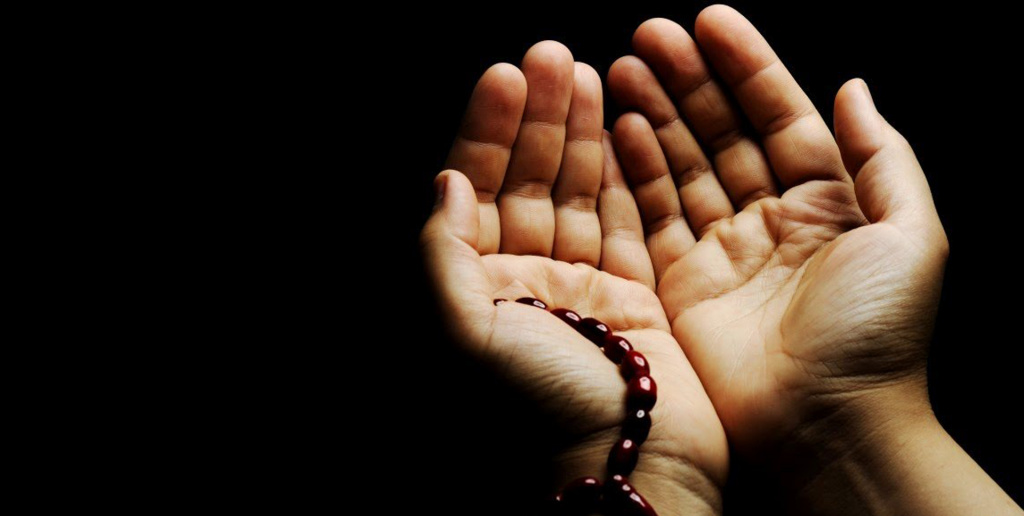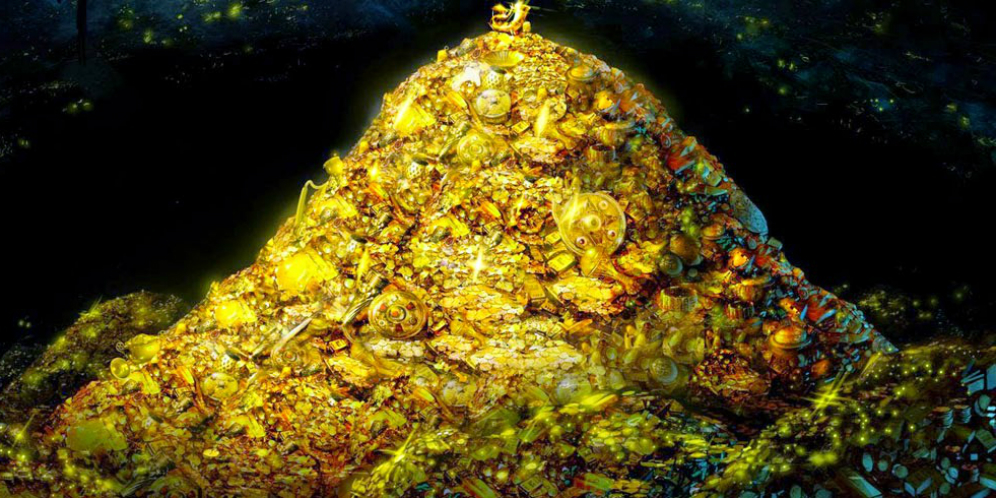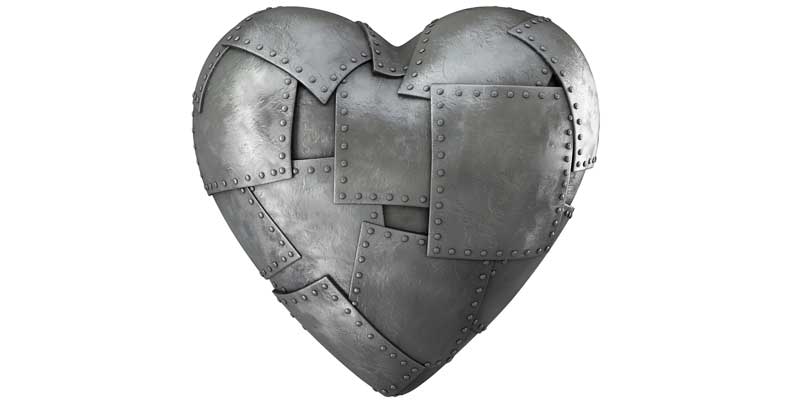بِسْمِ اللهِ الرَّحْمٰنِ الرَّحِيْمِ
The Qur’an and narrations of the prophet (ﷺ) give us an idea of the events that will occur on the day of resurrection. However, scholars have only attempted to put these events in specific order of occurrence, but we will go through them nevertheless.
After the first blowing of the horn by the angel Israfil, every single thing through the heavens and the earth will cease to exist, except that of which Allah wills.
“The horn is then blown a second time and every soul is brought back to life in a new creation.And the Horn will be blown, and whoever is in the heavens and whoever is on the earth will fall dead except whom Allah wills. Then it will be blown again, and at once they will be standing, looking on.” 39:68
Let us note that there will be no more passing away; after the resurrection there will be no more death.
“That is their recompense because they disbelieved in Our verses and said, ‘When we are bones and crumbled particles, will we [truly] be resurrected [in] a new creation?'” 17:98
“Does man think that We will not assemble his bones?
Yes. [We are] Able [even] to proportion his fingertips.” 75:3-4
The day of judgement itself is going to be 50,000 years of reckoning.
“The angels and the souls will ascend to Him during a Day the extent of which is fifty thousand years.” 70:4
A day that will be made easy for the believer; the prophet (ﷺ) said: “For the believers, the (length of) the Day of Resurrection will be like the time between Zuhr and ‘Asr.” [authenticated by al-Albaani]
And will be made extremely difficult for the disbeliever:
“True sovereignty, that Day, is for the Most Merciful. And it will be upon the disbelievers a difficult Day.” 25:26
That day there will be no water except for the pools provided with each of the prophets, the biggest of which will be Muhammad’s (ﷺ). This fountain requires an invitation of which is only for the believers who will be recognised by their glowing hands, foreheads and limbs from the effects of Wudu’. Once someone drinks from this pool, they will never be thirsty again.
On that day there will be one shade and that is the shade under the throne of Allah. The sun will be placed above the heads of the people; the prophet (ﷺ) said: “On the Day of Judgement, the sun will draw near the servants until it is a mile or two away from them. Then the sun will burn them, and they will be submersed in sweat based upon the amount of their deeds.
From among them there will be those whose sweat will come up to their two heels. From among them there will be those whose sweat will come up to their two knees. From among them there will be those whose sweat will come up to their groins. From among them there will be those who will be bridled in sweat.” [Muslim]
This shade is for whoever Allah wishes, but there is a hadith for those who have their reserved place. The hadith mentions 7 of whom Allah will shade on that day which we will mention in a future post if Allah wills.
The following narration paints a picture of what happens after some time passes:
The prophet (ﷺ) said: “The believers will gather together on the Day of Resurrection and will say: ‘Should we not ask [someone] to intercede for us with our Lord?’ So they will come to Adam and will say: ‘You are the Father of mankind; Allah created you with His hand He made His angels bow down to you and He taught you the names of everything, so intercede for us with you Lord so that He may give us relief form this place where we are.’
And he will say: ‘I am not in a position [to do that]..’ – and he will mention his wrongdoing and will feel ashamed and will say: ‘Go to Noah, for he is the first messenger that Allah sent to the inhabitants of the earth.’
So they will come to him and he will say: ‘I am not in a position [to do that]..’ – and he will mention his having requested something of his Lord about which he had no [proper] knowledge, and he will feel ashamed and will say: ‘Go to the Friend of the Merciful (Abraham)’.
So they will come to him and he will say: ‘I am not in a position [to do that]. Go to Moses, a servant to whom Allah talked and to whom He gave the Torah’. So they will come to him and he will say: ‘I am not in a position [to do that]..’ – and he will mention the talking of a life other that for a life, and he will fell ashamed in the sight of his Lord and will say: ‘Go to Jesus, Allah’s servant and messenger, Allah’s word and spirit.’
So they will come to him and he will say: ‘I am not in a position [to do that]. Go to Muhammad (ﷺ), a servant to whom Allah has forgiven all his wrongdoing, past and future.’
So they will come to me and I shall set forth to ask permission to come to my Lord, and permission will be given, and when I shall see my Lord I shall prostrate myself.
He will leave me thus for such time as it pleases Him, and then it will be said [to me]: ‘Raise your head. Ask and it will be granted. Speak and it will be heard. Intercede and your intercession will be accepted.'” [Bukhari]
The judgement will then commence. Allah will bring the scales which will weigh one’s good and bad deeds which will decide one’s fate.
“And the weighing [of deeds] that Day will be the truth. So those whose scales [of good deeds] are heavy – it is they who will be the successful.
And those whose scales are light – they are the ones who will lose themselves for what injustice they were doing toward Our verses.” 7:8-9
This is the ultimate judgement by Allah, all will be done with absolute justice. Everything little thing we have done will be accounted for.
“Indeed, Allah does not do injustice, [even] as much as an atom’s weight; while if there is a good deed, He multiplies it and gives from Himself a great reward.” 4:40
“That Day, the people will depart separated [into categories] to be shown [the result of] their deeds.
So whoever does an atom’s weight of good will see it,
And whoever does an atom’s weight of evil will see it.” 99:6-8
There will be types of people when it comes to the scale:
- The people who will enter paradise without measure: these are the elite Muslims. The prophet (ﷺ) said: “From among my followers, a group of 70,000 will enter Paradise without being asked for their accounts, Their faces will be shining like the moon.” [Bukhari] In another he (ﷺ) mentions: “My Lord has promised me that seventy thousand of my Ummah will enter Paradise without being brought to account or punished. With every thousand there will be (another) seventy thousand, and three handfuls of my Lord.” [Tirmidhi]
- The people who will have an easy reckoning. Aa’ishah said: I asked the Messenger of Allah (ﷺ) about the easy reckoning. I said: ‘O Messenger of Allah, what is the easy reckoning?’ He said: ‘A man’s sins will be shown to him, then he will be pardoned for them…’ [authenticated by al-Albaani] What this means is that Allah will not question every small thing one did; it will be more like a general check. It is for the righteous Muslims who stayed away from major sins and spent their lives in obedience to Allah.
- The people who will be examined thoroughly. Every small thing will be questioned; it is for those with weak Imane. This hisab will be a punishment in itself. There will be some Muslims that go through this tormenting check of their actions and Allah will forgive them – they would have paid their dues through this rigorous questioning by Allah, while for others it’ll be the beginning of further punishment.
When the Hisab is over, Allah will destroy all sources of light forming intense darkness and give each person their own noor (light). Some people will have this light – the brightness of which will be determined by their good actions – that will guide them as they walk to Jannah. Others will not see anything as each person will only be guided by their own light.
“On the Day you see the believing men and believing women, their light proceeding before them and on their right, [it will be said], “Your good tidings today are [of] gardens beneath which rivers flow, wherein you will abide eternally.” That is what is the great attainment.” 57:12
This light will guide these people towards the “Sirat” – the bridge to cross before getting to Jannah. The prophet (ﷺ) said: “Somebody will then announce, ‘Let every nation follow what they used to worship.’ So the companions of the cross will go with their cross, and the idolators (will go) with their idols, and the companions of every god (false deities) (will go) with their god, till there remain those who used to worship Allah, both the obedient ones and the mischievous ones, and some of the people of the Scripture. Then Hell will be presented to them as if it were a mirage.
Then it will be said to the Jews, What did you use to worship?’ They will reply, ‘We used to worship Ezra, the son of Allah.’ It will be said to them, ‘You are liars, for Allah has neither a wife nor a son. What do you want (now)?’ They will reply, ‘We want You to provide us with water.’ Then it will be said to them ‘Drink,’ and they will fall down in Hell (instead).
Then it will be said to the Christians, ‘What did you use to worship?’ They will reply, ‘We used to worship Messiah, the son of Allah.’ It will be said, ‘You are liars, for Allah has neither a wife nor a son. What: do you want (now)?’ They will say, ‘We want You to provide us with water.’ It will be said to them, ‘Drink,’ and they will fall down in Hell (instead). When there remain only those who used to worship Allah (Alone), both the obedient ones and the mischievous ones…” [Bukhari]
As the Muslims left approach the area in which the Sirat will be placed, Allah will come to them. The prophet (ﷺ) said: “Then the Almighty will come to them in a shape other than the one which they saw the first time, and He will say, ‘I am your Lord,’ and they will say, ‘You are not our Lord.’
And none will speak: to Him then but the Prophets, and then it will be said to them, ‘Do you know any sign by which you can recognise Him?’ They will say. ‘The Shin,’ and so Allah will then uncover His Shin whereupon every believer will prostrate before Him and there will remain those who used to prostrate before Him just for showing off and for gaining good reputation.
These people will try to prostrate but their backs will be rigid like one piece of a wood (and they will not be able to prostrate).” [Bukhari]
The Sirat will then be placed over Hellfire through which every single Muslim will have to cross. The prophet (ﷺ) said: “Then the bridge will be laid across Hell. We, the companions of the Prophet said, O Allah’s Apostle! What is the bridge?’ He said, It is a slippery (bridge) on which there are clamps and (Hooks like) a thorny seed that is wide at one side and narrow at the other and has thorns with bent ends.
Such a thorny seed is found in Najd and is called As-Sa’dan. Some of the believers will cross the bridge as quickly as the wink of an eye, some others as quick as lightning, a strong wind, fast horses or she-camels. So some will be safe without any harm; some will be safe after receiving some scratches, and some will fall down into Hell (Fire). The last person will cross by being dragged (over the bridge).” [Bukhari]
As with the Noor given in accordance to the deeds and imane one had in the world, the speed at which the sirat is crossed is in accordance with the same. If one makes it across there will be all the prophets of Allah waiting for their people.
However, before the gates of jannah there is one last stage; the prophet (ﷺ) said: “when the believers cross the Hellfire, they will be stopped at a small arched bridge (Qantarah) before entering paradise and will be given retribution for injustices between them until they become purified.
(Then) they will be permitted to enter Jannah. So, by the One in Whose Hands is my soul, they will know their way to their homes in Jannah, better than they know their ways to their homes in dunya.” [Bukhari]
This is for those who have transgressed between each other. Sins such as backbiting, slander, stealing etc. Here the people will have to forgive each other or choose to take from the other’s deeds. This is where we find who the prophet (ﷺ) mentioned as “bankrupt”.
He (ﷺ) said: “Do you know who is the bankrupt?” They said: “The bankrupt among us is one who has neither money with him nor any property”. He said, “The real bankrupt of my Ummah would be he who would come on the Day of Resurrection with Salat, Saum (fasting) and Sadaqah (charity), (but he will find himself bankrupt on that day as he will have exhausted the good deeds) because he reviled others, brought calumny against others, unlawfully devoured the wealth of others, shed the blood of others and beat others; so his good deeds would be credited to the account of those (who suffered at his hand).
If his good deeds fall short to clear the account, their sins would be entered in his account and he would be thrown in the (Hell) Fire”. [Muslim]
The above is the worse case scenario; most of the people at this stage will be merely a readjustment of their level of Jannah because of such sins – let us take heed of this. The transgresser will be de-ranked while the transgressed against will be elevated.
Once these people are accounted for, the gates of Paradise will be presented. The people will be greeted by the Angels and the keepers of Paradise. Allah said:
“But those who feared their Lord will be driven to Paradise in groups until, when they reach it while its gates have been opened and its keepers say, “Peace be upon you; you have become pure; so enter it to abide eternally therein,” [they will enter].” 39:73
This is an overall image of what will happen on Yawm Ul Qiyamah. Some extra details will be mentioned in future posts if Allah wills – they will be linked to other topics.
May Allah grant us all safe passage to Jannah.
Allah knows best.








